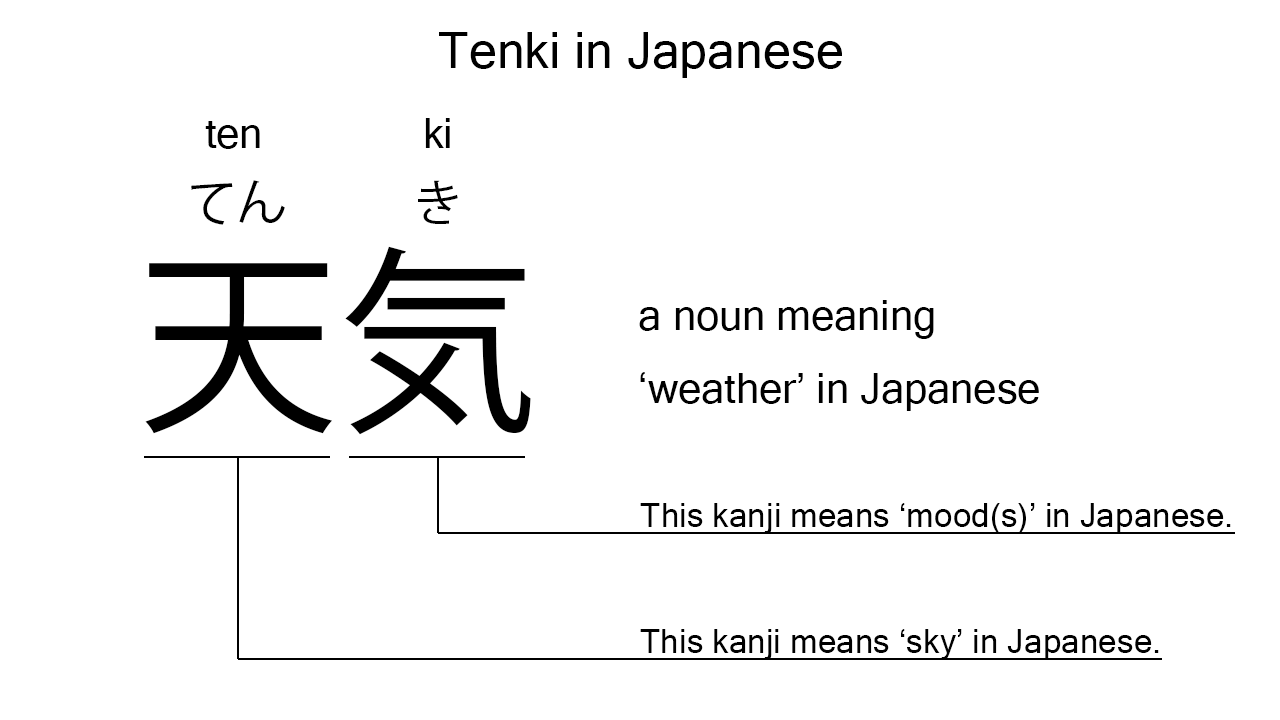What does “tenki” mean in Japanese?
Native speakers say “tenki” to mean ‘weather’ in Japanese. Perhaps, some Japanese learners know this word as it is sometimes used in Japanese conversations. In this blog post, however, I will explain this word in detail based on its kanji expression. And also, I will explain how to use it through example sentences. My explanations would help Japanese learners understand “tenki” more clearly. Then, let’s get started!
Contents
Definition and meaning of “tenki”
Let me start with the definition and meaning of “tenki”.
- tenki – 天気 (てんき) : a noun meaning ‘weather’ in Japanese.
Native speakers use this noun normally to mean ‘weather’ in Japanese. It’s also worth mentioning here that they sometimes use this to mean ‘good weather’ in Japanese.
The definition and meaning are simple and clear. To understand this noun more clearly, however, let me explain its kanji characters in detail, one by one.
What does “tenki” literally mean in Japanese?
The kanji expression of “tenki” consists of the following two kanji characters:
- 天 : a kanji character used to mean ‘heaven’ or ‘sky’ in Japanese.
- 気 : a kanji character used to mean ‘mood’, ‘feeling’, or such in Japanese.
These two kanji characters tell us that “tenki” literally means a ‘mood of the sky’ in Japanese. This literal interpretation is not in line with the actual meaning, but still understandable, I think. In Japanese, weather conditions are considered as moods of the sky.

When we meet new kanji expressions, we should check their kanji characters in detail to understand their meanings clearly and deeply. In many cases, kanji characters tell us a lot about the meanings of the expressions they form. Actually, here, we could get the better understanding of “tenki” through the detailed kanji check above.
So far, I’ve explained the definition and meaning of “tenki” together with its kanji characters. Then, let me explain how to use it through the example sentences below.
Example #1: how to say “weather” in Japanese
kyou wa tenki ga ii – 今日は天気が良い (きょうはてんきがいい)
It is nice weather today.
Below are the new words used in the example sentence.
- kyou – 今日 (きょう) : a noun meaning ‘today’ in Japanese.
- wa – は : a binding particle working as a case marker or topic marker. In the example, this works as a topic marker after “kyou” to put a focus on it.
- ga – が : a case particle used to make the subject word or the object word in a sentence. In the example, this is used after “tenki” to make the subject in the sentence.
- ii – 良い (いい) : an i-adjective meaning ‘nice’, ‘good’, or such in Japanese.
This is a typical usage of “tenki”. In this example, it works as a part of the commonly-used phrase, “tenki ga ii”, which literally means ‘the weather is nice’ in Japanese. It is often translated into English as ‘it is nice weather’, though.
Example #2: another usage of “tenki”
boku wa kinou tenki yohou wo mi ta – 僕は昨日天気予報を見た (ぼくはきのうてんきよほうをみた)
I checked the weather forecast yesterday.
Below are the new words used in the example sentence.
- boku – 僕 (ぼく) : a pronoun meaning ‘I’ in Japanese. This is used mainly by boys and young males.
- kinou – 昨日 (きのう) : a noun meaning ‘yesterday’ in Japanese. This can also work as an adverb almost anywhere in a sentence. In the example, this works as an adverb in the middle of the sentence to say “yesterday” in Japanese.
- yohou – 予報 (よほう) : a noun meaning ‘forecast’ in Japanese. This can also work as plural. Learn more about Japanese plural.
- wo – を : a case particle used to make the object word in a sentence. In the example, this is used after “tenki yohou” to make the object in the sentence.
- mi – 見 (み) : one conjugation of the verb, “miru“, which means ‘to see’, ‘to watch’, ‘to look’, or such in Japanese. In the example, it has been conjugated for the better connection with its following word.
- ta – た : an auxiliary verb used after a verb, adjective, or auxiliary verb to make its past tense form. Probably, this is well known as a part of Japanese ta form. In the example, this is used after “mi” to make its past tense form, “mi ta”.
This is another typical usage of “tenki”. In this example, it works together with “yohou” to make the longer noun, “tenki yohou”, which means a ‘weather forecast’ in Japanese. Native speakers often use this noun together with the verb, “miru”, to mean ‘to check the weather forecast’ in Japanese. It’s worth knowing.
Summary
In this blog post, I’ve explained the definition and meaning of “tenki” in detail based on its kanji expression. And also, I’ve explained how to use it through the example sentences. Let me summarize them as follows.
- tenki – 天気 (てんき) : a noun meaning ‘weather’ in Japanese. Native speakers use this noun normally to mean ‘weather’ in Japanese. It’s also worth mentioning here that they sometimes use this to mean ‘good weather’. These two kanji characters literally mean a ‘mood of the sky’ in Japanese. This literal interpretation is not in line with the actual meaning, but still understandable, I think. In Japanese, weather conditions are considered as moods of the sky.
Hope my explanations are understandable and helpful for Japanese learners.
Leave a Reply